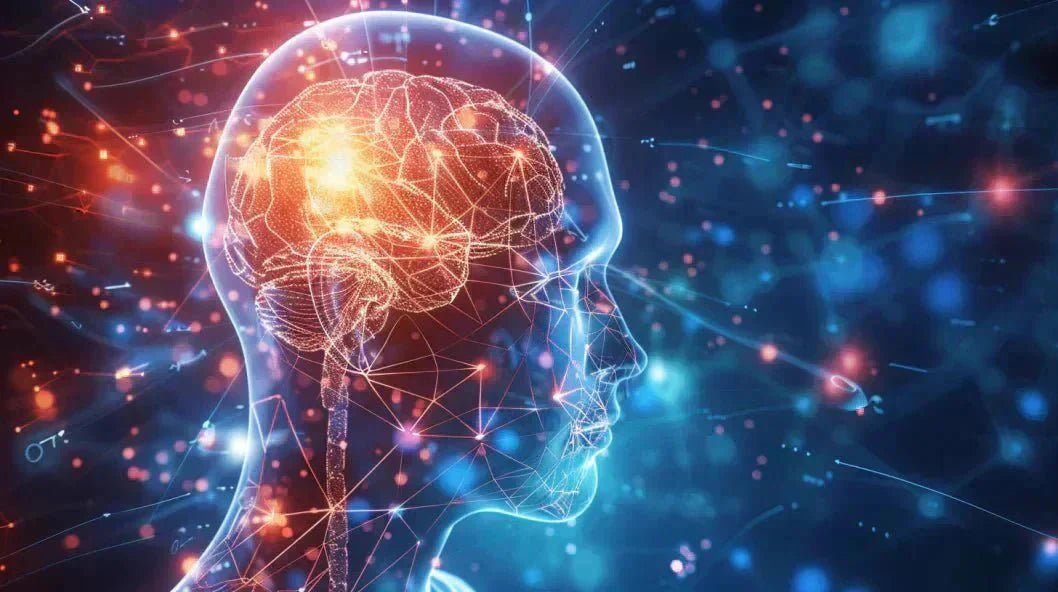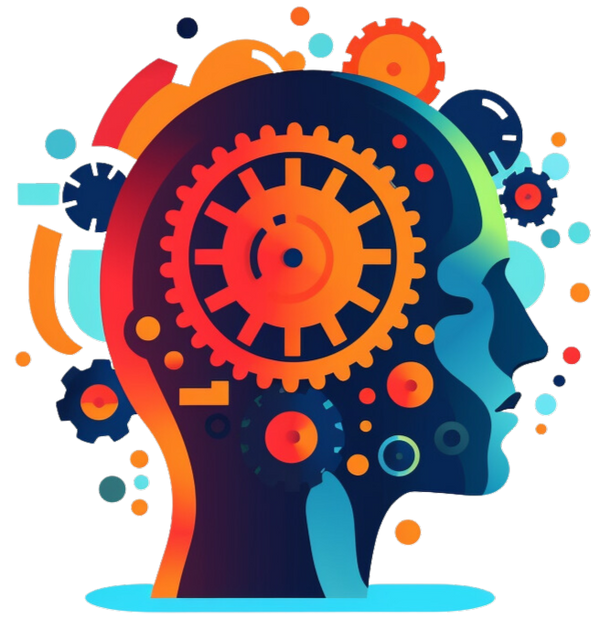
Evolution, Body, Brain: The Hidden Mechanisms of ADHD
Share
ADHD manifests itself not only in behavior, but also in the body. A clear and easy-to-understand look at the specific characteristics of those affected.
ADHD and the neurotransmitter dopamine are closely linked. Dopamine is – in all people – the neurotransmitter that controls motivation and impulse control . In people with ADHD, this system works differently : Dopamine levels drop more quickly because the substance is broken down more rapidly in the synapses (connection structures between nerve cells in the brain).
This explains typical symptoms such as restlessness, distractibility, and impulsivity . The reward system also becomes unbalanced. Things that motivate others are largely ineffective in ADHD. Instead, many sufferers seek more intense stimuli.

Dopamine not only affects the brain, but also physical functions such as heart rate, temperature regulation, and sweating . Many people with ADHD report extreme sensitivity to heat or cold, frequent sweating, or sudden chills.
ADHD & nervous system: tendency towards permanent stress in the body
The nervous system of people with ADHD is often in a "fight-or-flight" mode. The sympathetic nervous system remains overactive, even without external stress. Heart rate and blood pressure are elevated, and the body is working at full speed. Boredom, i.e., the absence of stimuli, leads to stress in people with ADHD. Their brains are not sufficiently challenged. However, when people work on something they find exciting, their stamina is almost endless – and their body and mood are in balance (homeostasis).
"But everyone feels that way a little bit": Yes, that's true. But not to such an extreme. A good analogy is a stovetop. While neurotypicals have their 5 to 10 levels of regulation, those with ADHD tend to have 3 to 5, or even just 2: fully present/hyperfocused or daydreaming/absent-minded.
Another metaphor is "a Lamborghini with bicycle brakes." When things get really busy, releasing energy is more difficult for people with ADHD than for neurotypicals. Moreover, while the car is a powerful marvel, it's not particularly fuel-efficient (see the more active metabolism in the ADHD body).
This hyperactivity explains why those affected quickly feel exhausted. Even minor stresses can then overwhelm the body. "Working against one's own nature" leads to this fatigue. This is often the case with routine processes, boring meetings and forms, etc. This makes rest breaks in everyday life all the more important.

The immune system of people with ADHD
Various studies show that the immune system is more active in people with ADHD. Inflammatory markers such as IL-6 and TNF-alpha are elevated. At the same time, those affected appear to be less likely to become seriously ill, even from infections. However, the immune system and neural functions are topics that are almost unmatched in complexity . Even with the artificial intelligence "Chat GPT," the inventors no longer know exactly where and how it works – only THAT it works.
But this increased activity also has downsides : An increased immune reaction can increase the risk of autoimmune diseases or chronic inflammation.
Metabolism and energy: Why people with ADHD tire more quickly
The metabolism of people with ADHD often runs at full speed. Energy consumption is increased because the liver works faster. Many report sudden hunger and cravings when dopamine levels drop.
These metabolic peculiarities mean that intensive mental tasks quickly lead to exhaustion. Furthermore, the frontal lobe of people with ADHD "saves" the consumption of glucose, the "fuel for thinking." This may be efficient, but in a modern society with sufficient food, it's also unnecessary. Regular energy intake and conscious breaks therefore greatly help in better managing everyday life.

ADHD and Evolution: The Hunter-Gatherer Theory
Why does ADHD even exist? The so-called hunter-gatherer theory offers a possible evolutionary explanation. It states that ADHD was advantageous in hunter-gatherer times.
Hunters benefited from speed, impulsiveness, and all-around vigilance in the old brain parts/partial hyperfocus in the frontal lobe (instead of little activity in the old – warning – hind parts and continuous focus in the frontal lobe). Gatherers used hyperfocus and curiosity/360-degree openness to discover new resources. Both groups, however, had to constantly be on guard against dangers such as predators. These traits, often considered "symptoms" today, were survival advantages in the past.
Even today, those affected often display quick reactions, creative approaches, and tireless drive – qualities that are valuable in many areas. In short, according to this theory, people with ADHD are the descendants of yesterday's hunter-gatherers . But in an age of supermarkets, such people are hardly needed anymore...

ADHD and the issue of temperature regulation
Many people with ADHD have difficulty regulating their temperature. This is understandable: Dopamine regulation in the brain influences the hypothalamus, the control center for body temperature.
Those affected report profuse sweating even under mild stress, or sudden chills. These characteristics require more mindfulness when dealing with physical stress. In our temperate climate (with hot summers), heat is more likely to be the problem. Others, genetically accustomed to the heat, may struggle with the cold.
Resilience despite ADHD: How the body protects itself
People with ADHD often show remarkable resilience. Some become seriously ill less frequently and seem to recover from infections more quickly. At the same time, stress-related symptoms such as irritable bowel syndrome or tension headaches occur more frequently. This also applies to depression and addiction problems: Much more common r. However, medicine refers to these as "comorbidities," or accompanying illnesses. If people with ADHD cannot live according to their natural predispositions, the resulting frustration and excessive demands lead, in the long term, to anxiety problems, depression, or substance abuse.

ADHD demonstrates how closely resilience and vulnerability are linked. The key lies in consciously managing one's own physical and mental resources.
Summary: Understanding ADHD – from head to body
ADHD affects the brain, body, and metabolism in a variety of ways. Dopamine, the nervous system, and evolutionary mechanisms explain many symptoms and characteristics.
Anyone who has or suspects ADHD can make their everyday life easier through targeted measures. A thorough ADHD test or an accurate ADHD diagnosis can help them better understand their strengths and challenges.
One thing is certain: ADHD is much more than a "disorder" – it contains unique abilities that, in the right environment, become a great strength.

Supplement: Specialist agencies, associations and clubs for ADHD
If you would like to learn more about ADHD or seek support, you can find valuable information and support from these specialist agencies and associations:
SWITZERLAND
- elpos Switzerland : Support and counseling for parents and those affected by ADHD. In addition to regional counseling centers, elpos also offers events and continuing education opportunities. www.elpos.ch
- ADHD 20+ : An association specifically for adults with ADHD. Its focus is on exchange, counseling, and promoting self-help. www.adhs20plus.ch
- ADHD/ADS Switzerland : Information platform and network for those affected and professionals. Courses, lectures, and support are offered. www.ads-adhs.ch
GERMANY
- ADHS Deutschland eV : One of the largest ADHD associations in Germany. It offers information on diagnostics, therapy, and everyday support for children, adolescents, and adults. www.adhs-deutschland.de
- Central ADHD Network : A nationwide network supporting those affected and their families, with a focus on knowledge transfer and regional support. www.zentrales-adhs-netz.de
- ADHD Infoportal : Specialist portal of the German Institute for Medical Documentation and Information (DIMDI) with comprehensive information on diagnostics, treatment, and research. www.adhs.info
All of these organizations help to better understand ADHD and find appropriate support – whether for children, adolescents, or adults.
FAQ: What you (maybe) always wanted to know
1. How does ADHD affect the body beyond the brain?
ADHD affects not only behavior but also the body. One example is temperature regulation: Affected individuals often suffer from heat or have a sensitivity to cold, which is due to their altered dopamine regulation. ADHD also manifests itself through increased energy expenditure and more frequent stress reactions throughout the organism.

2. Are there evolutionary advantages of ADHD?
Yes, Thom Hartmann's hunter-gatherer theory explains ADHD as an evolutionary advantage in the hunter-gatherer era. According to this theory, quick reactions, hyperfocus, and alertness helped with survival in the past. Today, these traits are less necessary, but can be a great strength in creative or dynamic environments.
Various experiments and studies, as well as genetic research on Neanderthals, have substantiated this theory (originally proposed by a journalist). It is now gaining increasing acceptance among psychologists and biologists/anthropologists.
3. Why do people with ADHD seek more intense stimuli?
The reward system in the brain of people with ADHD is less sensitive to everyday stimuli and abhors routines that are always exactly the same. The faster degradation of dopamine in the synapses of people with ADHD means they are much less susceptible to extrinsic motivation—when the motivational triggers don't match their interests.
They also often have difficulty controlling impulses (or suppress impulses for years to "fit in"). To satisfy their neurodiversity, those affected often seek out stronger, more exciting stimuli.

2 comments
Hallo das hört sich gut an an !Aber heute in der Zeit fallen unsere Kinder durch das System . Die Schulzeit von 9 jahren und die Medikamente und Psychologen und. und und sind das einzige was man bekommt . Schule und Lehrer sind nicht mit der Krankheit bewandert . Ich habe die Nase voll von Menschen die ohne Herz ♥️ ihr Ding durchziehen . Unser System ist emotionslos und berechnend .
Guten Morgen,
Besteht die möglichkeit sich im bereich ADHS Weiterzubilden.
Was ich bisher über Sie gelesen habe ist sehr überzeugend.
Ichbstehe vor einem Vortrag über das wunderbare Thema ADHS.
Bin selber doppelt betroffen(Familie)
Ich finde diese Menschen sind in unserer Zeit eine Bereicherung unserer Gesellschaft.
Ich versuche bei ADHS hielfe+ADHS+ Kurse zu Besuchen.
Bin wie ein Schwamm der alles Gute Hielfreiche über ADHS aufsaugt☺️
Freundliche Grüsse
Maria Sahnoune-Michelatsch